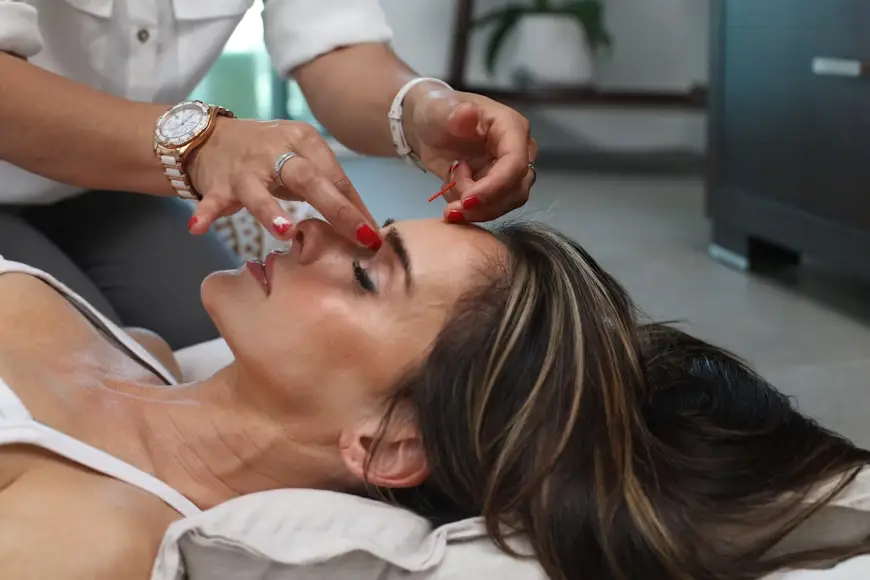Your sinuses are four pairs of hollow spaces tucked behind the forehead, eyes, nose, and cheeks. They help keep your breathing passages clear by making mucus, which sweeps out bacteria, dust, and other unwelcome guests. Most of the time, these cavities are just filled with air, but if something gets in the way—like allergies, a cold, COVID-19, dust, smoke, or nasal polyps—they can become blocked. That’s when you’re likely to notice the all-too-familiar facial pressure, blocked nose, and that annoying headache.
Acupuncture, an ancient practice from traditional Chinese medicine, is sometimes considered for easing sinus problems. In fact, some people explore acupuncture as a treatment for sinusitis to seek relief from congestion and related discomfort. The technique uses very fine needles inserted at certain spots on the body, aiming to encourage the natural flow of energy, or ‘qi.’ This is believed to help bring things back into balance and boost the body’s ability to heal. Although more research would help clarify how effective it really is, generally, if a qualified practitioner is involved, acupuncture is thought to be a safe alternative approach to tackling sinus woes.
How Acupuncture Works for Sinus Issues
In Traditional Chinese Medicine, good health is rooted in the smooth movement of qi, the body’s vital energy. The idea is that this energy travels through lines called meridians. If qi gets blocked, it can throw things off physically and emotionally. Acupuncture steps in here: by placing very fine needles at specific points, practitioners aim to help clear any stuck energy, especially along pathways linked to sinus function.
Modern science takes a different approach. Researchers believe acupuncture might work by nudging the nervous system and triggering certain bodily responses. The National Center for Complementary and Integrative Health notes that while there’s still a lot to learn, acupuncture could affect how our bodies manage pain and inflammation. Stimulating the nerves may lead to a release of helpful chemicals like endorphins, which can ease discomfort from sinus congestion.
Some research even finds acupuncture offers as much relief for allergic rhinitis—think stuffy nose and pressure—as leading antihistamines. Still, studies are mixed, and better-quality research is needed before anyone can say for sure how effective acupuncture really is for sinus issues.
Efficacy of Acupuncture in Sinus Treatment
While the research into acupuncture for sinus problems is still catching up, there are some promising findings, especially for allergic rhinitis and chronic rhinosinusitis. If you struggle with allergies, acupuncture might provide relief from blocked noses, headaches, sinus pressure, and even that constant postnasal drip. In fact, a 2022 review found that acupuncture could boost quality of life for adults with allergic rhinitis, performing as well as popular antihistamines like cetirizine and loratadine.
For those living with chronic rhinosinusitis, the evidence is less clear. A 2022 meta-analysis reviewed a range of clinical studies but couldn’t offer a firm answer. Many of these studies had small participant numbers or mixed in other treatments like acupressure, making it tricky to figure out what part acupuncture actually played.
So, the short version: acupuncture shows potential, particularly for allergy-related sinus troubles, but the research still has a way to go. Larger, well-conducted studies are needed before experts can be fully confident about how well acupuncture works for sinus problems.
Comparative Effectiveness of Acupuncture

Recent studies have taken a close look at how acupuncture stacks up against conventional treatments for chronic rhinosinusitis (CRS), such as medication and surgery. Standard approaches typically rely on nasal sprays, steroids, antibiotics and other medicines, but these don’t always work well and can bring unwanted side effects like drug resistance or repeated flare-ups. Sometimes, people even end up needing surgery when medicines fall short. Because of this, some people are exploring options like acupuncture to see if they can find better relief.
Acupuncture, whether used on its own or alongside standard treatments, has shown promise in reducing symptoms for CRS. According to a major review of the research, people reported less pain and congestion, with improved scores on scales that measure how much symptoms affect day-to-day life. What’s more, there didn’t appear to be an increase in the risk of serious side effects with acupuncture when compared to typical treatments.
Adding acupuncture to regular medical care can also be helpful. It may boost the results of antibiotics, let people use lower doses of medication, or even speed up recovery following surgery. This can be an attractive option, considering acupuncture tends to be gentle, safe, and relatively affordable.
Still, it’s important to keep expectations grounded. The reviewed studies varied in their methods and quality, which means the evidence, while encouraging, isn’t yet rock solid. More high-quality research is needed to confirm how well acupuncture works for CRS and to iron out the best way to use it in practice.
Safety Considerations and Best Practices
Acupuncture is generally safe when carried out by a properly qualified and licensed practitioner. These professionals follow strict safety guidelines, using sterile, single-use needles to keep any risk of infection or other complications low.
Mild side effects can happen. Some people might feel a bit queasy, experience a spell of dizziness, or have small aches or tenderness where the needles were placed. Usually, these pass quickly and don’t cause lasting trouble.
Acupuncture isn’t right for everybody. If you’re pregnant, be aware that certain points could bring on labour too soon, so extra care is needed. If you have a pacemaker, treatments involving electrical current could mess with its function and should probably be avoided. Those on blood thinners or with bleeding problems are more likely to bruise or bleed after acupuncture, so it’s important to take extra care.
Finding the right practitioner matters. Always check your acupuncturist’s training and credentials, for example through the National Certification Commission for Acupuncture and Oriental Medicine (NCCAOM) registry, and confirm their licence with your state board. It’s wise to ask about their experience with sinus conditions, what kind of treatment plan they suggest, and whether insurance or other payment options are available. A practitioner who matches your needs and style can make your experience smoother and help you get the most from treatment.
Economic and Practical Aspects of Treatment
The financial side of choosing acupuncture for sinus treatment boils down to a few key points: average costs, whether your insurance will help, and how many sessions you might need. According to a survey of over 300 qualified acupuncturists, the typical price for a full course tackling chronic sinus and nasal issues is about £590, though this can shift quite a bit based on where you live, the acupuncturist’s background, and how long each visit lasts.
Insurance can be unpredictable here. Some health plans pitch in for acupuncture—either covering part or all of the cost—especially if it’s recognised as a treatment for particular conditions. It’s always wise to ask your insurer about this before booking your first appointment.
Getting the most out of acupuncture usually means going for several sessions. A usual plan might mean weekly visits for a set period, and when you add up the expense, it’s worth having a clear conversation about your budget and what makes sense for you.
If you’re thinking about using acupuncture along with regular treatments for sinus problems, a bit of planning goes a long way. Try working with both your doctor and your acupuncturist to create a plan that lets each treatment complement the other. Keeping everyone in the loop can help avoid any clashes between treatments. Organising your acupuncture sessions around your medicines or other medical procedures can also make things smoother and might help ease your symptoms more effectively.
Future Directions and Clinical Potential
Interest in acupuncture as part of sinus care is on the rise. People are curious about ways to boost their comfort and go beyond the usual options for congestion and headaches. Acupuncture has caught attention for possibly easing these nagging symptoms, with current findings pointing to some benefit, particularly for allergic rhinitis.
Studies so far suggest that acupuncture could offer relief similar to well-known antihistamines like cetirizine and loratadine. Still, the research has its limits. Many trials involve few participants or have methods that could be improved, so bigger and better studies are needed to truly understand how well it works and how it does its job in the body.
Even so, adding acupuncture into a mixed approach to sinus care holds promise. It may work alongside standard treatments, providing a chance for people to depend less on medications or support recovery after medical procedures. Acupuncture’s part in this bigger picture fits well with a more combined health plan, encouraging both patients and professionals to consider it as a worthwhile piece of managing sinus problems.
Also Read: What Is Health Science? A User-First Deep Dive into an Expanding Field
And follow Wellhealthorganic Fitness for more.
